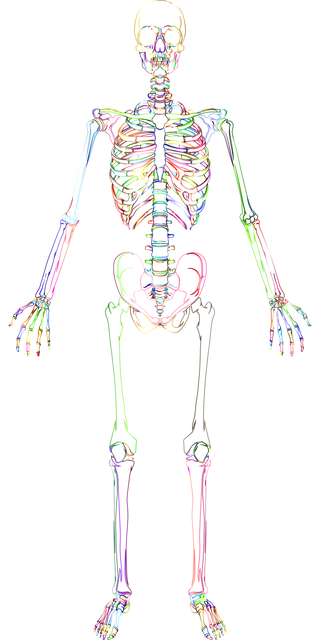AI is transforming functional nervous system MRI by analyzing vast data sets to detect intricate neural patterns and correlations. This enhances understanding of brain function, enables early diagnosis of neurological and psychiatric disorders, and supports personalized treatment planning. AI-driven imaging reveals subtle abnormalities, aiding in targeted interventions and improving patient outcomes. However, ethical considerations like data privacy, informed consent, and algorithm transparency are crucial for responsible AI integration into neuroscience.
“Artificial Intelligence (AI) is revolutionizing the field of neuroscience, particularly in advancing nervous system imaging. This article explores the transformative impact of AI on three key areas: functional MRI to unlock nerve function, high-resolution imaging techniques, and personalized medicine through tailored treatments. We delve into the ethical considerations surrounding AI integration, highlighting both benefits and potential challenges. With AI’s growing role in functional nervous system MRI, understanding these advancements is crucial for researchers and healthcare professionals alike.”
Unlocking Nerve Function: AI's Role in Functional MRI
AI is transforming the field of nervous system imaging, particularly in understanding complex neural functions through functional magnetic resonance imaging (fMRI). By analyzing vast amounts of fMRI data, AI algorithms can detect intricate patterns and correlations that were previously hard to discern. This capability allows researchers to unlock insights into nerve activity, mapping brain regions involved in specific cognitive tasks or identifying neural circuits underlying behaviors.
In the context of functional nervous system MRI, AI contributes significantly to improving both the sensitivity and specificity of image analysis. Machine learning models can learn from large datasets, enabling them to distinguish between active and inactive brain areas with greater precision. This advancement paves the way for more accurate diagnosis and personalized treatment planning in neurological and psychiatric disorders, ultimately enhancing our understanding of the human brain’s intricate workings.
Enhancing Resolution: AI-Driven Imaging Techniques
AI-driven imaging techniques are revolutionizing the field of nervous system exploration, particularly in enhancing the resolution of functional nervous system MRI. By employing advanced machine learning algorithms, researchers can now extract intricate details from complex neuroimaging data that were previously challenging to discern. This improved resolution allows for a more precise mapping of brain activity, enabling scientists to study neural networks with unprecedented accuracy.
For instance, deep learning models can analyze vast amounts of imaging data, identifying subtle patterns and variations in brain structure and function. These innovations are opening new avenues for understanding neurological disorders, as researchers can now detect early signs of conditions like Alzheimer’s or Parkinson’s disease through fine-grained observations of the nervous system.
Personalized Medicine: Tailoring Treatments with AI
AI is transforming the field of nervous system imaging, paving the way for personalized medicine approaches. By analyzing vast amounts of data from functional nervous system MRI scans, AI algorithms can identify unique patterns and markers associated with various neurological conditions. This enables healthcare professionals to tailor treatments specifically to individual patients, improving outcomes and patient care.
For example, AI can assist in detecting subtle abnormalities in brain structure or activity that may be indicative of specific disorders. With this information, physicians can prescribe targeted interventions, such as modified therapy protocols or personalized medication regimens. The integration of AI into nervous system imaging not only enhances diagnostic accuracy but also contributes to more effective and personalized treatment strategies.
Ethical Considerations: Navigating AI Integration in Neuroscience
As artificial intelligence (AI) integrates into neuroscience, ethical considerations become paramount. The advancement in functional nervous system MRI, driven by AI, promises unprecedented insights into brain function and behavior. However, it raises concerns about data privacy, informed consent, and potential biases in interpretation. Researchers must ensure that AI algorithms are transparent, auditable, and developed with a diverse, representative dataset to mitigate risks of misdiagnosis or misinterpretation.
Moreover, the interpretability of AI-driven results is crucial for building trust among clinicians and patients. The “black box” nature of some AI models may hinder their application in clinical settings where clear explanations are vital. Striking a balance between leveraging AI’s computational power and maintaining human oversight will be essential to navigating this integration successfully and ensuring the responsible advancement of neuroscience.
Artificial Intelligence (AI) is revolutionizing nervous system imaging, from enhancing the resolution of functional MRI (fMRI) scans to unlocking insights into nerve function. By leveraging AI-driven techniques, healthcare professionals can achieve more accurate diagnoses and personalize treatments for diverse neurological conditions. As we navigate the ethical considerations of integrating AI into neuroscience, the potential for advancing our understanding of the complex nervous system continues to grow exponentially, promising a future where AI plays an indispensable role in improving patient outcomes.
